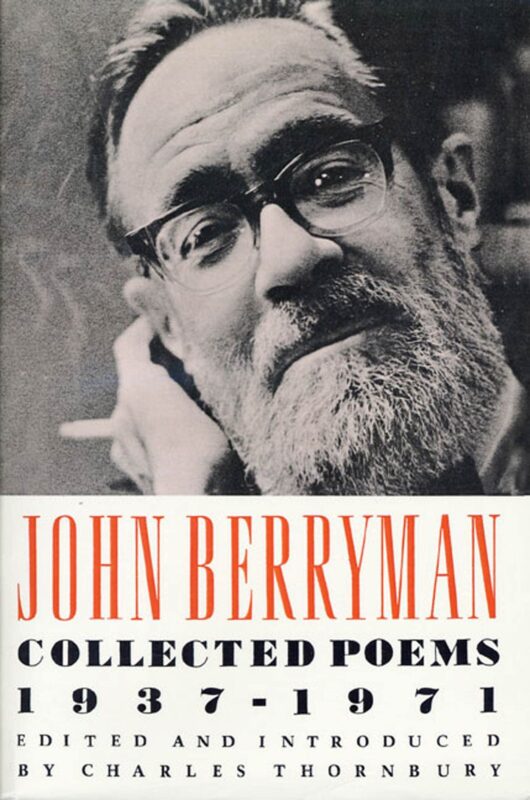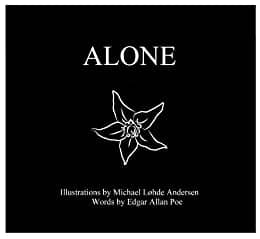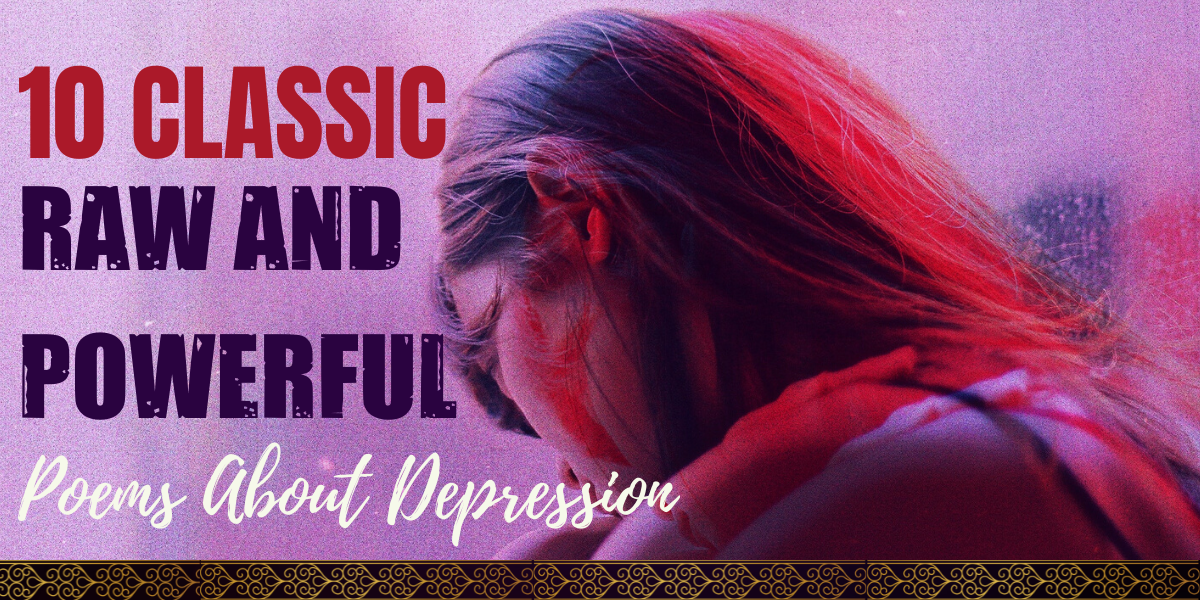Anyone who has suffered from depression knows just how hard it can be. And while no two people’s mental health issues are the same, we can often find comfort in knowing that we’re not alone.
According to the World Health Organization statement, depression affects more than 264 million people worldwide. Unfortunately, that number is increasing. In the US alone, it’s estimated that 20% of adults have had depression at some point in their lives.
Anyone can develop depression at any point in their lives, even children. And while sometimes a bout of depression is brought on by an event, such as trauma-related depression and postpartum depression, it often seems to strike at random.
But despite the grim reality of this mental health problem, there is hope. More than 80% of people struggling with depression see an improvement in their symptoms after seeking and receiving help.
Comfort in Poetry from Depression
One way to connect with your own experience and the experience of others is through poetry. You may have heard the age-old theory that creative people, especially poets, are more prone to mental illness. There’s even a name for it; The Sylvia Plath Effect, named after the famous American poet who sadly took her own life at the age of 30 after battling with depression for years.
It seems that a creative mind is a sensitive mind. For many writers and artists, the ups and downs of life have inspired their finest work. It’s fair to say that when it comes to artistic expression, the most successful writers are also the ones who struggle the most with mental illness.
Whether or not there’s a link between poetic prowess and depression is still up for debate, but one thing’s for sure, there’s no shortage of poems written on the subject. Depression is a significant theme in the work of many of the greatest poets who ever lived.
Below, I’ve chosen ten of the rawest and most powerful poems about depression ever written. These classic works address the harsh reality of struggling with mental health. While everyone’s personal experiences differ, hopefully, you will find some comfort, solace, and solidarity in their words.
But a quick word of caution before we begin; while these poems can be a source of comfort, they could also be a trigger to some. If you’re struggling with depression or know someone, it’s essential to seek help. Speak to someone you trust, and talk to your doctor, who can help you put some coping strategies in place and, in some cases, provide treatment to help you manage the symptoms. Remember, help is out there, and you don’t have to do this alone.
With that said, here are my top 10 picks of the rawest and powerful poems about depression from some of the greatest poets who ever lived.
1. Mirror by Sylvia Plath

I am silver and exact. I have no preconceptions.
Whatever I see I swallow immediately
Just as it is, unmisted by love or dislike.
I am not cruel, only truthful‚
The eye of a little god, four-cornered.
Most of the time I meditate on the opposite wall.
It is pink, with speckles. I have looked at it so long
I think it is part of my heart. But it flickers.
Faces and darkness separate us over and over.
Now I am a lake. A woman bends over me,
Searching my reaches for what she really is.
Then she turns to those liars, the candles or the moon.
I see her back, and reflect it faithfully.
She rewards me with tears and an agitation of hands.
I am important to her. She comes and goes.
Each morning it is her face that replaces the darkness.
In me she has drowned a young girl, and in me an old woman
Rises toward her day after day, like a terrible fish.
2. It Was Not Death, For I Stood Up by Emily Dickinson

It was not Death, for I stood up,
And all the Dead, lie down—
It was not Night, for all the Bells
Put out their Tongues, for Noon.
It was not Frost, for on my Flesh
I felt Siroccos—crawl—
Nor Fire—for just my Marble feet
Could keep a Chancel, cool—
And yet, it tasted, like them all,
The Figures I have seen
Set orderly, for Burial,
Reminded me, of mine—
As if my life were shaven,
And fitted to a frame,
And could not breathe without a key,
And ’twas like Midnight, some –
When everything that ticked—has stopped—
And Space stares—all around—
Or Grisly frosts—first Autumn morns,
Repeal the Beating Ground—
But, most, like Chaos—Stopless—cool—
Without a Chance, or Spar—
Or even a Report of Land—
To justify—Despair.
3. He Resigns by John Berryman

Age, and the deaths, and the ghosts.
Her having gone away
in spirit from me. Hosts
of regrets come and find me empty.
I don’t feel this will change.
I don’t want anything
or person, familiar or strange.
I don’t think I will sing
anymore just now,
or ever. I must start
to sit with a blind brow
above an empty heart.
4. The Swimming Lesson by Mary Oliver

Feeling the icy kick, the endless waves
Reaching around my life, I moved my arms
And coughed, and in the end saw land.
Somebody, I suppose,
Remembering the medieval maxim,
Had tossed me in,
Had wanted me to learn to swim,
Not knowing that none of us, whoever came back
From that long lonely fall and frenzied rising,
Ever learned anything at all
About swimming, but only
How to put off, one by one,
Dreams and pity, love and grace, –
How to survive in any place.
5. The Wasteland by T.S. Eliot

April is the cruellest month, breeding
Lilacs out of the dead land, mixing
Memory and desire, stirring
Dull roots with spring rain.
Winter kept us warm, covering
Earth in forgetful snow, feeding
A little life with dried tubers.
Summer surprised us, coming over the Starnbergersee
With a shower of rain; we stopped in the colonnade,
And went on in sunlight, into the Hofgarten
And drank coffee, and talked for an hour.
Bin gar keine Russin, stamm’ aus Litauen, echt deutsch.
And when we were children, staying at the archduke’s,
My cousin’s, he took me out on a sled,
And I was frightened. He said, Marie,
Marie, hold on tight. And down we went.
In the mountains, there you feel free.
I read, much of the night, and go south in the winter.
Bonus Read: 11 Best Mary Oliver Poems About Life, Death, and everything
6. The Fury of Rainstorms by Anne Sexton

The rain drums down like red ants,
each bouncing off my window.
The ants are in great pain
and they cry out as they hit
as if their little legs were only
stitched on and their heads pasted.
And oh they bring to mind the grave,
so humble, so willing to be beat upon
with its awful lettering and
the body lying underneath
without an umbrella.
Depression is boring, I think
and I would do better to make
some soup and light up the cave.
7. Alone by Edgar Allan Poe

From childhood’s hour I have not been
As others were-I have not seen
As others saw-I could not bring
My passions from a common spring-
From the same source I have not taken
My sorrow-I could not awaken
My heart to joy at the same tone-
And all I lov’d-I lov’d alone-
Then-in my childhood-in the dawn
Of a most stormy life-was drawn
From ev’ry depth of good and ill
The mystery which binds me still-
From the torrent, or the fountain-
From the red cliff of the mountain-
From the sun that ’round me roll’d
In its autumn tint of gold-
From the lightning in the sky
As it passed me flying by-
From the thunder, and the storm-
And the cloud that took the form
(When the rest of Heaven was blue)
Of a demon in my view-
8. Odeon Melancholy by John Keats

No, no, go not to Lethe, neither twist
Wolf’s-bane, tight-rooted, for its poisonous wine;
Nor suffer thy pale forehead to be kiss’d
By nightshade, ruby grape of Proserpine;
Make not your rosary of yew-berries,
Nor let the beetle, nor the death-moth be
Your mournful Psyche, nor the downy owl
A partner in your sorrow’s mysteries;
For shade to shade will come too drowsily,
And drown the wakeful anguish of the soul.
But when the melancholy fit shall fall
Sudden from heaven like a weeping cloud,
That fosters the droop-headed flowers all,
And hides the green hill in an April shroud;
Then glut thy sorrow on a morning rose,
Or on the rainbow of the salt sand-wave,
Or on the wealth of globed peonies;
Or if thy mistress some rich anger shows,
Imprison her soft hand, and let her rave,
And feed deep, deep upon her peerless eyes.
She dwells with Beauty – Beauty that must die;
And Joy, whose hand is ever at his lips
Bidding adieu; and aching Pleasure nigh,
Turning to poison while the bee-mouth sips:
Ay, in the very temple of Delight
Veil’d Melancholy has her sovran shrine,
Though seen of none save him whose strenuous tongue
Can burst Joy’s grape against his palate fine;
His soul shalt taste the sadness of her might,
And be among her cloudy trophies hung.
9. The Despair by Abraham Cowley

Beneath this gloomy shade,
By Nature only for my sorrows made,
I’ll spend this voyce in crys,
In tears I’ll waste these eyes
By Love so vainly fed;
So Lust of old the Deluge punished.
Ah wretched youth! said I,
‘Ah, wretched youth!’ twice did I sadly cry:
‘Ah, wretched youth!’ the fields and floods reply.
When thoughts of Love I entertain,
I meet no words but ‘Never,’ and ‘In vain.’
‘Never’ alas that dreadful name
Which fuels the infernal flame:
‘Never,’ My time to come must waste;
‘In vain,’ torments the present and the past.
‘In vain, in vain!’ said I;
‘In vain, in vain!’ twice did I sadly cry;
‘In vain, in vain!’ the fields and floods reply.
No more shall fields or floods do so;
For I to shades more dark and silent go:
All this world’s noise appears to me
A dull ill-acted comedy:
No comfort to my wounded sight,
In the suns busy and imperti’nent Light.
Then down I laid my head;
Down on cold earth; and for a while was dead,
And my freed soul to a strange somewhere fled.
‘Ah, sottish Soul’ said I,
When back to its cage again I saw it fly;
‘Fool to resume her broken chain!
And row her galley here again!’
‘Fool, to that body to return
Where it condemn’d and destin’d is to burn!
Once dead, how can it be,
Death should a thing so pleasant seem to thee,
That thou shouldst come to live it o’re again in me?’
10. Aubade by Philip Larkin

I work all day, and get half-drunk at night.
Waking at four to soundless dark, I stare.
In time the curtain-edges will grow light.
Till then I see what’s really always there:
Unresting death, a whole day nearer now,
Making all thought impossible but how
And where and when I shall myself die.
Arid interrogation: yet the dread
Of dying, and being dead,
Flashes afresh to hold and horrify.
The mind blanks at the glare. Not in remorse
—The good not done, the love not given, time
Torn off unused—nor wretchedly because
An only life can take so long to climb
Clear of its wrong beginnings, and may never;
But at the total emptiness for ever,
The sure extinction that we travel to
And shall be lost in always. Not to be here,
Not to be anywhere,
And soon; nothing more terrible, nothing more true.
This is a special way of being afraid
No trick dispels. Religion used to try,
That vast moth-eaten musical brocade
Created to pretend we never die,
And specious stuff that says No rational being
Can fear a thing it will not feel, not seeing
That this is what we fear—no sight, no sound,
No touch or taste or smell, nothing to think with,
Nothing to love or link with,
The anaesthetic from which none come round.
And so it stays just on the edge of vision,
A small unfocused blur, a standing chill
That slows each impulse down to indecision.
Most things may never happen: this one will,
And realisation of it rages out
In furnace-fear when we are caught without
People or drink. Courage is no good:
It means not scaring others. Being brave
Lets no one off the grave.
Death is no different whined at than withstood.
Slowly light strengthens, and the room takes shape.
It stands plain as a wardrobe, what we know,
Have always known, know that we can’t escape,
Yet can’t accept. One side will have to go.
Meanwhile telephones crouch, getting ready to ring
In locked-up offices, and all the uncaring
Intricate rented world begins to rouse.
The sky is white as clay, with no sun.
Work has to be done.
Postmen like doctors go from house to house.
Conclusion
These powerful, raw, and honest poems are a poignant reminder of the destructive effect that depression can have on our lives.
If you’re suffering from depression, remember that this is not a battle you have to face alone. Speak with someone you trust, and contact your doctor about getting help. You can also reach out to one of the many fantastic mental health charities out there, such as Mental Health America, who can help you find the support you need.
You May Also Like: 15 Best Poetry Books of All Time



